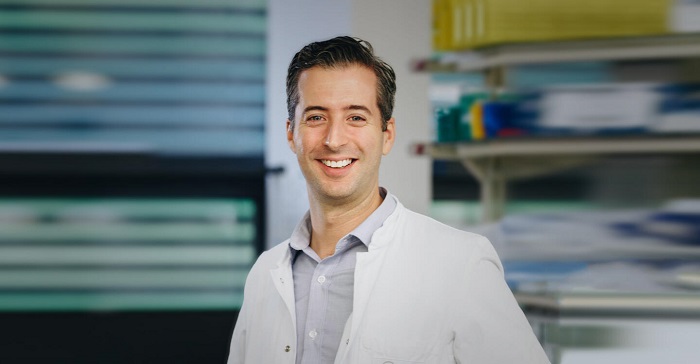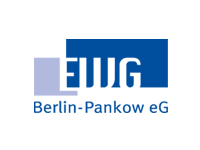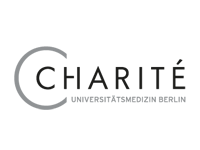Your selection
Research, Patient care / 03.09.2020
In pursuit of the origin and role of ecDNA

How does cancer develop and how does it progress? Dr. Anton Henssen from the Experimental and Clinical Research Center (ECRC) wants to find out more about circular DNA in order to use its cancer cell-specific characteristics for therapy, diagnosis or clinical prognosis. He has now been awarded an ERC Starting Grant.
The research community is increasingly turning its attention to the role of extrachromosomal DNA in cancer development. According to the latest research, cancer cells appear to have the ability to produce small, ring-shaped sections of extrachromosomal DNA known as ecDNA, which they can then reintegrate into existing chromosomal DNA. If the original order of DNA segments is disrupted, this can lead to the dysregulation of cell growth and cancer.
“We have already shown that this phenomenon occurs more frequently than previously thought in primary neuroblastoma, a type of cancer found primarily in children,” confirms Dr. Anton Henssen, scientist at the Experimental and Clinical Reseach Center (ECRC ), a facility jointly operated by the Charité – Universitätsmedizin Berlin and the Max Delbrück Center for Molecular Medicine in the Helmholtz Association (MDC). Henssen also works as a physician at Charité’s Department of Pediatrics, Division of Oncology and Hematology. He adds: “This observation suggests that the circularization of DNA is an important driver behind the remodeling of cancer cell DNA”.
The intention of CancerCirculome
The launch of the CancerCirculome project will see the pediatric oncologist and Emmy Noether Independent Junior Research Group leader work alongside his research team to unravel the principles governing DNA modifications in pediatric cancers. Over the next five years, the researchers will focus on the mechanisms and effects of DNA circularization and the reintegration of DNA fragments into chromosomes. “The details of how ecDNA is made and how it replicates remain unknown. To get closer to identifying the origin of these tiny ring-shaped fragments, we will reconstruct the exact DNA sequences they contain,” explains Henssen. He adds: “To do this we will identify the molecular factors responsible for the generation and replication of ecDNA at the single-cell level.”
The team hope to discover previously unknown mechanisms which cause cells to lose control over cell growth and proliferation. “These mechanisms could be used as new diagnostic and treatment targets – not just in pediatric cancers, but as a fundamental principle governing all cancers,” says Henssen, who is also a BIH Charité Clinician Scientist and a researcher at the German Cancer Consortium (DKTK). Using single-cell CRISPR-based methods (which enable researchers to alter and disrupt ecDNA in a targeted manner), the researchers will attempt to demonstrate the biological effects of DNA circularization and reintegration. The researchers plan to target and manipulate the genetic information contained in ecDNA fragments inside human cells in order to evaluate their effects on cancer cell fitness and function. The researchers also plan to study the behavior, presence and genomic integration of these fragments at the single-cell level during cancer treatment. The aim is to uncover the oncogenic role of ecDNA and determine the mechanisms responsible for the reintegration of ecDNA into chromosomes.
The researchers hope to translate this knowledge into clinical benefits for patients. “We hope to use our understanding of the underlying principles to define novel diagnostic and predictive markers which could then be used for the personalized diagnosis, risk assessment and treatment of cancers,” concludes Henssen. The researchers’ long-term aim is to contribute to and inform our understanding of different cancers, and to support clinical trials involving personalized treatments for children with difficult-to-treat cancers.
Further information
Overview News
News Buch Berlin
From cell biology to CRISPR/Cas – new knowledge for schools
The Life Science Learning Lab at the Berlin-Buch research campus offers both school students and teachers the opportunity to immerse themselves in science. This year, the facility celebrates its 25th ...
more ...ERC grants Berlin scientists € 2.5 million each
Neuroscientists Gary Lewin and James Poulet at the Max Delbrück Center for Molecular Medicine have won highly coveted and competitive ERC Advanced Grants to study pain and the neural mechanisms that u...
more ...The Protein Expert
Prof. Dr. Fan Liu from the Leibniz-Forschungsinstitut für Molekulare Pharmakologie (FMP) has recently received several awards for her contributions to the field of cross-linking mass spectrometry.
more ...Events Buch Berlin
19.04.2024, 08:30
Lehrkräftekongress: Gemeinsam Schüler:innen für Naturwissenschaften begeistern - gemeinsam Zukunft gestalten
Der Verband der Chemischen Industrie e.V., Landesverband Nordost, das Max Delbrück Center, das Leibniz-Forschungsinstitut für Molekulare Pharmakologie im Forschungsverbund Berlin e.V., das Gläserne La...
more ...21.04.2024, 16:00
Großes Sinfoniekonzert "Durch die Nacht zum Licht"
Saisonauftakt der Bürgersinfonie mit Werken von Beethoven, Mendelssohn Bartholdy und Berwald
more ...06.05.2024, 09:00
Realtime PCR und digital PCR Kurs
Der RealTime PCR und Digital PCR Kurs richtet sich an erfahrene PCR Anwender*innen und an Einsteiger*innen. Wichtige PCR Grundlagen werden erörtert, bevor die RealTime PCR besprochen und Genexpression...
more ...







